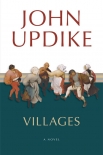Villages, John Updike [brene brown rising strong .TXT] 📗

- Author: John Updike
Book online «Villages, John Updike [brene brown rising strong .TXT] 📗». Author John Updike
“What shall we do?” he asked her.
She was silent, as if she had fainted.
In charge by default, he told her, “We’ve got to get you to the hospital. Can you hop, holding on to my shoulder?” They made it to the car, to the emergency room of the local hospital, where a crude cast was fashioned, and the next day to Massachusetts General Hospital, an hour away in Boston.
For the month afterwards, they did not make love, though he demonstrated love, in his own eyes, by bringing her meals he prepared, by learning to do the laundry and the cooking, and by playing backgammon and watching public television with her at night. After the month, they agreed they should try sex again, though she would have to lie safely still beneath him, and he must be careful of her mending bones. At Mass. General she had been prescribed not a plaster cast but, in the latest therapeutic fashion, a plastic boot—space-tech in feeling, overlapping blue and gray with a ridged sole curved like a chair rocker. It could be briefly removed but had to stay on during something as strenuous as fucking. He tried to hover above her, on his elbows and knees, sparing her as much of his weight as he could, and to his grateful amazement felt her rise to him, in her excitement, quicker than usual; she ground her pubic bone against his decisively and they came together—gemlike dragonflies coupling in air. Breathless afterwards, Julia stared up at him from the pillow with that cloudy face of satisfied desire which puts a man, briefly, right with the universe, all debts honored, all worries unmasked as negligible.
It might have been the boot. In their first winters in this underheated wooden house, built a century ago as a summer home, it excited them both if she left on her woolly socks. They made her somehow more naked and not less. Husband and wife disagreed politically and suffered a frequent misalignment of prejudices, but an alignment in their nervous systems made up for it. She came from coastal Connecticut and had had “advantages.” She used to drive an MG convertible to private day school, through a succession of leafy villages, across a succession of iron bridges. Her school had no basketball or football team; the main sports were tennis, golf, and equestrian competition, including polo. Julia pretended to disbelieve that these had not been offered at Willow High, and that his idea of a happy, fulfilled summer had been walking down through his back yard, past the grape arbor with its buzzing Japanese-beetle traps, past his grandfather’s asbestos-shingled chicken house, and cutting across a cornfield to a playground, where it sat on a kind of artificial mesa beside the town baseball field, and killing time all day with a pack of other brown-legged waifs. Summer camp had lain beyond the family financial horizon, and the thought, for squeamish, timid, hydrophobic Owen, of living in a cabin with other boys and canoeing in a deadly black cold lake was in any case terrifying. The whole rugged, self-testing world of the rich, born to command and rule, was fortunately beyond him.
He was afraid of the water, of heights, of spiders, of the dark, of choking, of tough boys, of batsy things. At a travelling fair he had once been placed, rather roughly, by an overworked young attendant, on a smelly spotted pony and had felt impossibly high off the ground, worse than when mounted on his father’s shoulders, because the animal under him felt less intelligent and more skittish—as scared, almost, as Owen himself. When Julia, at their local golf, tennis, and equestrian club, swings herself up on the stirrup and becomes, in her scarlet coat and round black riding helmet, a horsewoman ten feet high, he is moved to more sincere awe than when, sixty years before, he had looked up, hand on his heart, at the flag Miss Mull each morning raised at the Willow playground. On its creaking pulley it would be hauled up through the nine o’clock sun and couldn’t be long looked at, since the the fiery body left a pulsing purple spot on his retina that he feared would some day blind him. Computer screens often leave a similar pulsing afterimage, but he still sees. Seventy, he still sees, walks on his own legs, and, except when Julia calls to him from too distant a room, hears well enough. More reckless males his age have been deafened by gunfire, lamed by contact sports. His natural caution, overriding the desire to be a test pilot, has paid off.
Considering his many qualms and the cloistered household his four guardians struggled to maintain around him, the wonder is that he has managed in life as well as he has. His only-child capacity for self-amusement, his patience





Comments (0)